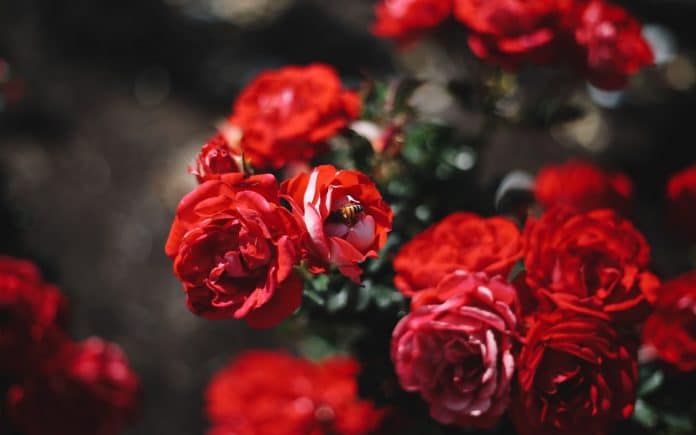
Come April, I dream of roses. Not about planting them or about cultivating them. The roses I dream of grow only in my imagination and begin to bloom there about the third week of April, during the Baha’i festival of Ridvan, when I call to mind the intoxicating scent of the sweet flower of my childhood that once grew in my grandmother’s garden—the Peace rose.
My grandmother lived on 100 acres of rich farmland in Oxford County, southwestern Ontario, where she grew vegetables, raised turkeys and pigs, milked cows, cultivated fruit trees and, at the end of each summer, canned her harvest for the winter.
But in a life filled with practical duties—not least of which was raising five children born in the span of six years—she still took time to cultivate roses. Her rosebushes produced thick clusters of blossoms whose red, pink, yellow, and white petals adorned the foundation of her house and gave off a powerful aroma that permeated the air of the yard and even wafted into the house.
As a child, I loved to stroke those rose petals. How soft they were, as soft as my baby brother’s forehead, and how supple when smoothed for pressing. I was intrigued by the names of the different varieties— the Peace rose, in particular, fascinated me. What did roses have to do with peace? I wondered.
As I learned much later, the Peace rose that grew in my grandmother’s garden was named so at the end of the Second World War when Francis Meilland, the horticulturalist who saved the cultivar by sending clippings out of France before the German invasion, wrote to Field Marshal Alan Brooke to thank him for his key role in the liberation of France.
When Meilland asked Brooke to give his name to the rose, he declined, saying that his name would soon be forgotten, but the name of “peace” would endure forever and, therefore, be a more fitting one for the rose. At the inaugural meeting of the United Nations in San Francisco later that year, Peace roses were presented to each of the delegations, with a note tied to each stem that read: “We hope the ‘Peace’ rose will influence men’s thoughts for everlasting world peace.”
Roses and peace—it seems a natural connection. As Keats put it, “A thing of beauty is a joy forever.” What’s more, a balm to the soul and a source of spiritual sustenance. In Persian literature, the rose even serves as a symbol of the spiritual intoxication that results from the mystical union of lover and beloved, as in this poem by the thirteenth century Persian poet and mystic, Rumi:
“Come, come,/The roses are in bloom!/ Come, come,/The Beloved has arrived!//Now is the time to unite/ the soul and the world….”*
Several centuries later, the rose appears in the writings of Baha’u’llah, the prophet and founder of the Baha’i Faith, this time as a symbol of a new religious dispensation, a time of the “Most Great Peace” when every spiritual seeker will, at last, attain the presence of the Beloved:
Hear Me, Ye mortal birds! In the Rose Garden of changeless splendor a Flower hath begun to bloom, compared to which every other flower is but a thorn, and before the brightness of Whose glory the very essence of beauty must pale and wither. Arise, therefore, and, with the whole enthusiasm of your hearts…endeavor to inhale the fragrance of the incorruptible Flower…. Whoso followeth this counsel will break his chains asunder, will taste the abandonment of enraptured love, will attain unto his heart’s desire, and will surrender his soul into the hands of his Beloved.
Marking the beginning of the holiest and most significant of all Baha’i festivals, Ridvan (“Paradise” in Persian) commemorates Baha’u’llah’s assumption of his prophetic office and his announcement to his followers of the inauguration of a new age, a spiritual springtime during which all the peoples of the world would live together in harmony, the flowers of one garden.
The declaration of Baha’u’llah on April 22, 1863, came at a time of great upheaval for his followers as they prepared to leave Baghdad on the path of exile, but it also came in a place of great beauty, in the Najibiyyh Garden — a garden filled with roses.
One can imagine the impact of Baha’u’llah’s words on the small group of believers that clustered around him, as they were uttered in a garden filled with the overpowering aroma of a myriad of roses. Little is known about his epoch-making declaration, but the one account we do have, by an historian named Nabil, tells the story in this way:
Every day…ere the hour of dawn, the gardeners would pick the roses which lined the four avenues of the garden, and would pile them in the center of the floor of His blessed tent. So great would be the heap that when His companions gathered to drink their morning tea in His presence, they would be unable to see each other across it. All these roses Bahá’u’lláh would, with His own hands, entrust to those whom He dismissed from His presence every morning to be delivered, on His behalf, to His Arab and Persian friends in the city. **
Two summers ago I bought my daughter a Peace rosebush. When I noticed a few rather scant rosebushes for sale in front of our local grocery store, I knew I had to buy one. I could imagine it thriving in the small plot that is my daughter’s own space in our garden.
Roses and peace—to inhale the fresh fragrance of the one is to know the other. And for my daughter, too, roses have become a symbol of Ridvan. Come April, her own rosebush may not be budding yet, let alone blooming, but we can always go out and buy half a dozen roses.
Red, pink, yellow, or white—whatever their color, they have the same effect when placed in a vase and set on a small Persian carpet under a makeshift tent of silk curtains in our family room, where my daughter shares something of the intoxication of this celebration with her friends each year at her annual Ridvan party.
Though my daughter’s Ridvan gathering usually takes the form of an ordinary sleepover party, the roses add a scent of mystery and serve as a reminder of the story of the Najibiyyih Garden and its spiritually intoxicated believers who, as they peered over a mountain of roses, recognized in Baha’u’llah the Promised One.
*Jonathan Star, Rumi: In the Arm of the Beloved (New York: Penguin Putnam, 2000).
** The DawnBreakers, or Nabil’s Narrative of the Early Days of the Baha’i Revelation, translated by Shoghi Effendi (London, England: Baha’i Publishing Trust, 1953).



































Lovely words about roses peace and faith
I really enjoyed reading this article and learning about the Peace rose and the Bahai faith
[…] day order be rolled up and a new one spread out in its stead.” The horror of war fuels the yearning for peace; and as the inadequacy of the old methods of resolving conflict becomes painfully and repeatedly […]